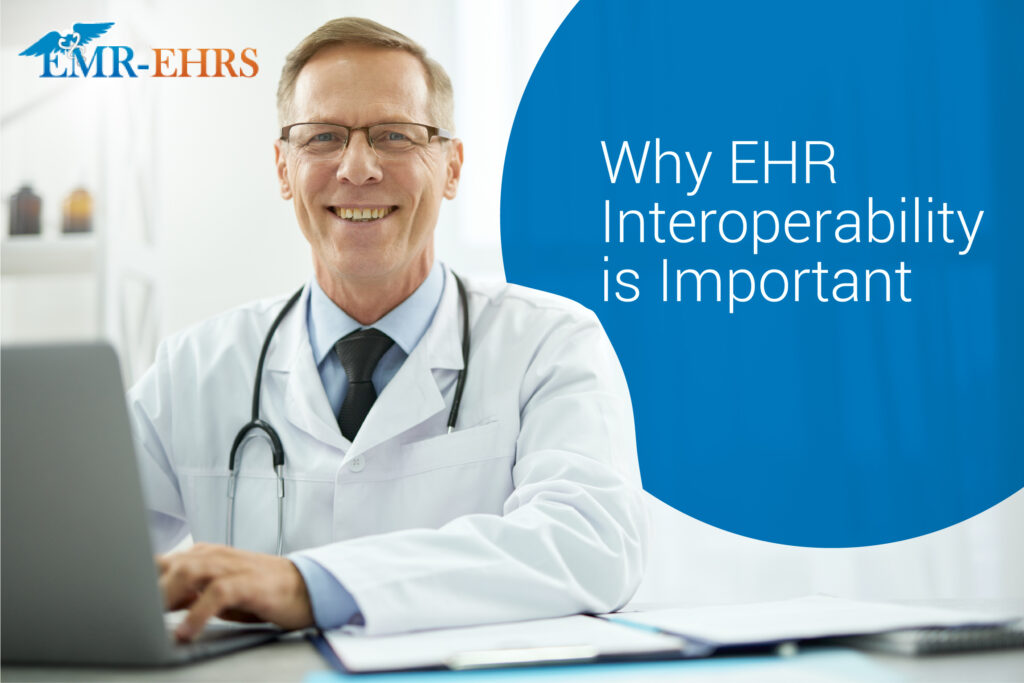Why EHR Interoperability is Important

Today, interoperability is a crucial determinant of success for healthcare providers. As well as facilitating access to, sharing, and utilizing data, it fosters the goal of optimizing the health of the individual and population.
This article will explain why electronic health record (EHR) interoperability is important.
But what does interoperability actually mean?
The Healthcare Information and Management Systems Society (HIMSS) defines interoperability as the ability to connect information systems, devices, or applications within and across organizational boundaries in a coordinated manner. When focusing on the health care system, the concept of interoperability enables exchanging and sharing of data from various sources such as hospitals, laboratories, clinics, and medical practices.
The use of specific EHR systems varies among health care systems depending on factors such as the size of facilities and state regulations. Meanwhile, health care facilities need to interact with each other to exchange patient information (and the facilities they encounter often use different EHR systems, making it difficult to exchange data).
By having EHR interoperability, sharing of medical data is easy between different EHRs and providers. It will also guarantee information portability and usability.
5 Benefits of EHR Interoperability
- Open to Organizational Communication
Organizations can improve communication with other medical facilities by implementing EMR/EHR interoperability. For instance, pharmacies can send clinics e-prescription requests and vice versa. Furthermore, healthcare facilities can fill information gaps faster by making their systems more open to data sharing. EMR interoperability lets healthcare organizations access patient health records without involving calls, emails, and faxes.
- Patient-Centric
The focus is on patient convenience. People want the freedom to move around the country freely while having their medical records readily available at their local hospitals. Waiting for your medical data from another health care facility can be too much of a hassle. An analysis has also found that 55% of hospitals report robust data exchange due to EHR interoperability.
Using this system, people no longer have to provide details of previous treatment or undergo repeat diagnostics with every new appointment. Their healthcare experience will be more proactive, relevant, and accurate.
- Lower Healthcare Costs
Interoperable EHRs reduce the administrative burden of healthcare by streamlining and reducing the cost of paperwork, tests, and prescription orders. A synchronized system can send and receive data automatically. Therefore, this provides fewer resources and lower costs than non-inoperable systems.
- Reduced Errors
The connection between informational systems generally leads to better data quality and fewer errors. Regardless, this is a better option than systems that are not connected and have higher chances of containing duplications and outdated data.
- Improves Patient Safety
Regarding interoperability, patient privacy and security should be the primary concerns. Despite its complexity, this process can help ensure patient privacy and security by requiring organizations to fully assess where their protected health information (PHI) resides and who should have access to it. If systems cannot communicate, for instance, it becomes difficult for organizations to keep track of all systems interacting with PHI, as HIPAA security regulations require.
The interoperability of EHRs provides clinicians with the reassurance that the PHI they input is secure. By entering PHI into a secured system, organizations can better understand where their data resides and who has access to it, enhancing patient privacy and helping them secure their patient data..
Three different levels of EHR Interoperability
Foundational Interoperability: The data exchanged between two systems must not require any interpretation from the receiving system.
Structural Interoperability: This type of interoperability is more complex due to structuring and interpreting data at the individual data field level while ensuring data integrity.
Semantic Interoperability: It enables systems to exchange and interpret information. Hence, this level is highly desired as authorized users can access patient information electronically.
So, why is EHR interoperability important?
If physicians are unable to access patient information quickly, the uses of patient data will be limited regardless of whether all practices adopt an EHR.
Here’s where interoperability comes in. Interoperability between EHRs is vital since it improves patient outcomes and safety through superior communications between healthcare professionals. Additionally, interoperability allows physicians and nurses to access clinical data regardless of location, enabling them to treat patients anywhere and at any time, whether the data originated inside or outside their health system.
Patients can move between different healthcare facilities and EHR systems electronically, making it easier for doctors to treat their patients and for healthcare organizations to share patient information.
With increased and seamless interoperability between EHRs, data can be globally shareable, improving patient care and providing more efficient referrals and transfers between providers.
Conclusion
Every healthcare professional should recognize the importance of interoperability. Since wired and wireless networks connect so many technology solutions in government and industry, it’s important to stay on top of developments in interoperability. Get the latest updates by subscribing to our blogs!
Choose the Top EMR/EHR Software
Over the years, we have assisted medical practices with EHR/EMR selection, implementation, and software usage. We specialize in providing customized EMR/EHR software to meet your practice’s specific needs.
Schedule a demo or contact us through the contact form for more personalized information. Let’s work together to find the best software for your practice!
Do you have a favorite EHR add-on service? You are free to comment below!
